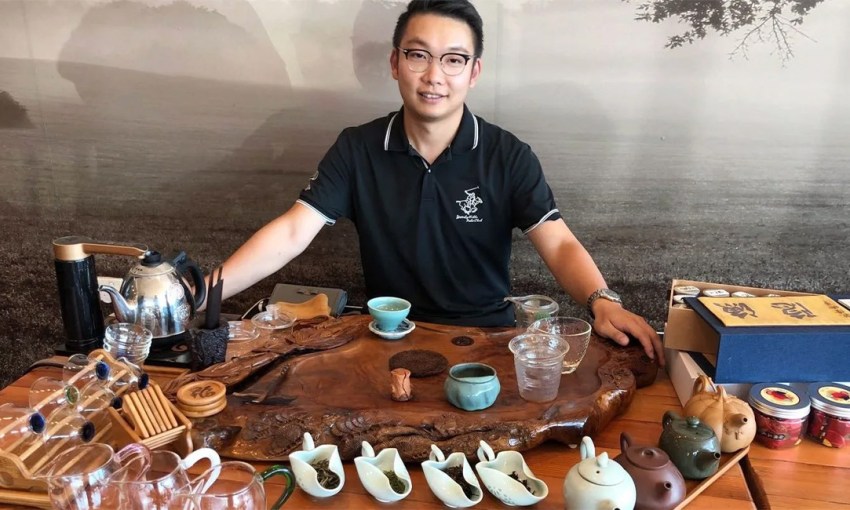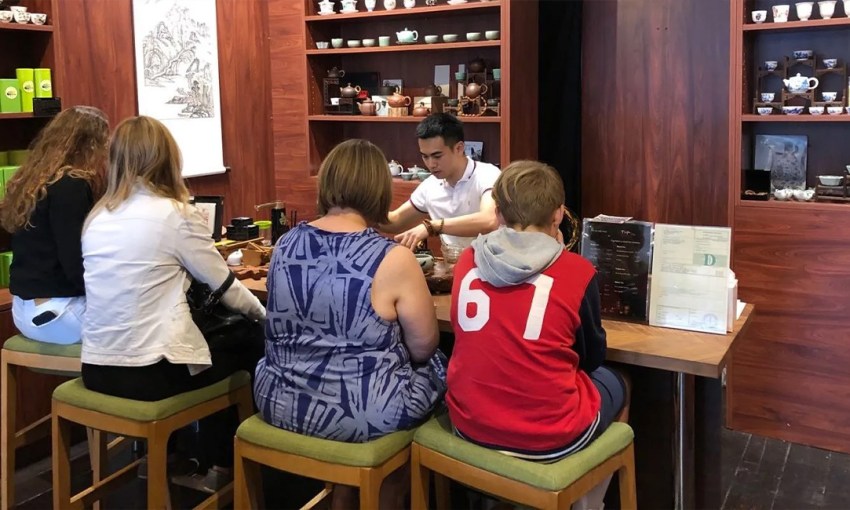You’ve done a wine or gin flight and nailed the tasting notes. Now, it’s time to give tea tasting a go.
It’s high time for a tea ceremony
The proprietor of T Life, Hao Wu, or Wayne to his customers and friends, comes from a family of tea producers.
He is part of the third generation working in and promoting the family’s tea plantation and business in Changsha, Hunan, a five-hour trip west from Shanghai by high-speed train.
Take your enjoyment of tea to the next level by booking a private tea ceremony at T Life.
The mountainous province is ideal for tea growing, with high humidity and year-round rainfall. In January and February, favourably, the region is blanketed by snow. Low temperature tolerance is associated with the health of tea plants.
Here in Adelaide, T Life, the family’s shop on The Parade, has been open for more than eight years, presenting the authentic flavour of tea that is prized in tea drinking, a daily tradition that stretches back millennia.
His family’s finest black, white and oolong teas are all proudly displayed for sale, along with dozens of others from China and Japan.
Walking into T Life is the equivalent of walking into a boutique wine store – and with Australians gradually catching up on the varietals and nuances of tea, going to a tasting or ceremony may soon be all the rage.
When Wayne first arrived in Australia, “people were really interested in the different tastes, but they [didn’t] really focus on the traditional Asian styles”. By different tastes he means the blended western teas, like English breakfast.
“Most of the Eastern or Asian styles are more focussed on the single-region style,” Wayne says. “We’re more interested to discover the authentic flavours of the tea, not other complementary flavours.”
Since COVID hit, he’s seen a big increase in people interested in not only the health benefits, but also the flavour profiles of tea. Like wine, he says, they are dependent on the growing region, climate, terroir and the maturation process.
“Generally speaking, tea has the five categories… green tea, white tea, oolong tea, black tea and dark tea. [The type of tea depends] on the fermentation levels,” Wayne says.
They are all Camellia sinensis, but with the different levels of fermentation, the tea develops different aromas, colours and flavours. (And yes, we are talking about a camellia plant, not unlike those beloved by Adelaide Hills gardeners.)
“In Japan, the green tea is more grassy or seaweed tasting, but in China most of green tea actually has a nutty flavour or roasted flavours,” Wayne says, pointing to the preferred fixation process in each country – respectively, steaming and dry-frying or roasting – as having a major impact on the final flavour.
Talking with Wayne is like opening a door to tea history and culture. Take for instance the compressed cakes and bricks of tea. “The original purpose was for storage and transportation, but nowadays it’s actually for the ageing process,” he says.
Aged tea improves in flavour to deliver a more complex, sweeter and mellow tasting profile. In store, he has tea cakes and bricks with vintages ranging from 2005 to 2020. The latter is still undergoing ageing before being released to customers.
Wayne is passionate about his work and studied at the Tea Research Institute in China to become a certified National Tea Master and Tea Taster.
Asked to share his favourite tea, he names oolong, which sits somewhere between green and black, with semi-fermentation delivering fresh grassy flavours alongside rich black tea notes. He says “it’s the most complicated process” that requires a great deal of skill to get the roasting right. It’s also only produced in China.
For those who want to start exploring tea, Wayne says partaking in a tea ceremony class is a great start. As with a guided tasting, there is a focus on identifying the individual characteristics of the tea.
The tea ceremony also offers an introduction to tea drinking etiquette and hospitality, with traditions like the ‘fair cup’ in play.
It’s a half hour well spent for tea drinkers, with ceremonies catering for groups of up to five people.
Contact the store to make a booking.





